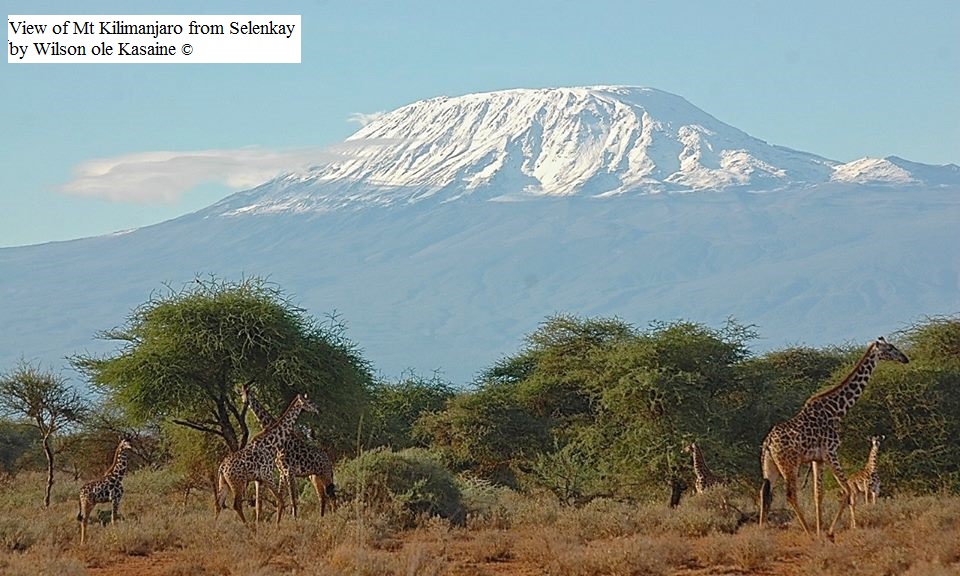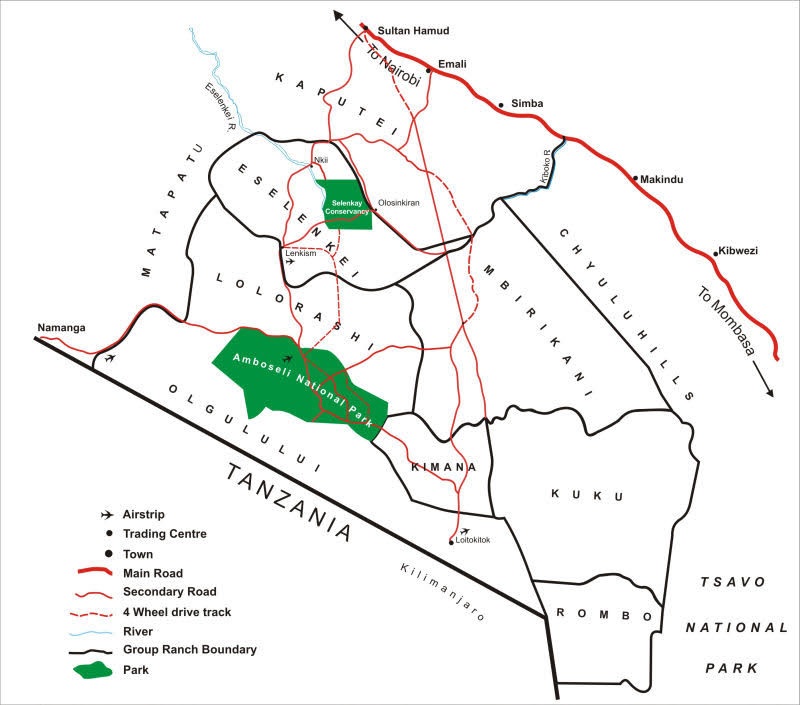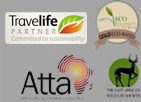
The location of Amboseli National Park makes it a huge attraction for inclusion in a Kenya safari holiday. The whole park is overlooked by the world famous views of Mount Kilimanjaro. Kilimanjaro is undoubtedly best seen at dusk or dawn when low hanging clouds thin out to reveal the iced summit of this continent’s highest mountain. This backdrop has contributed to this park being amongst the most visited in Kenya, which has brought its own drawbacks . Years of tourism and off-road excursions have impacted on the park making it appear rather dusty, overused and eroded. A program to improve access with new roads and a much tougher stance taken against off-roading are gradually remedying the situation.
Lake Amboseli, after which this Kenyan National Park is named, is usually an empty expanse of volcanic soil. Even during the wettest years its depth rarely exceeds two feet and this creates a mirage of a shimmering lake making the horizon appear fluid. The parched dry lake bed is offset by the contrasting lush green vegetation in the marsh and swamp areas which are created by underground springs rising to the surface through the porous soil. High doses of toxic salts from a raised water table are partially responsible for the decline in the number of acacias that used to tower around the marsh area, a decline that had previously been totally blamed on Elephants stripping the bark for food.
The park’s open landscape is home to large herds of elephants whose population is one of the few in Africa that has been spared the butchery of poachers. Elephant numbers are now well over 1000 and they live in their natural social structures of matriarchal families and bull elephant groups. Predators in the park include hyenas, jackals; lions, leopards and cheetahs. Birdlife in abundance flourishes particularly in the marshes and swamps. Over 420 species have been counted within the park as a whole including 6 species of vulture, 12 species of heron and 10 varieties of eagle.
Selenkay Conservancy: 10 miles north of the boundary of Amboseli Park is the Selenkay Conservancy. Selenkay shares the same eco-system as Amboseli and is established on 12,500 acres of land within the nearly 200,000 acres Eselenkei Group Ranch leased from the local Maasai by Gamewatchers Safaris with the aim of protecting the wildlife habitat and encouraging wildlife conservation as an alternative to farming as a means for the local population to earn a living.
Roads into the very heart of Selenkay’s Maasailand have been created and a single camp built: the Porini Amboseli Camp which is part of the Porini group of camps set up by Gamewatchers Safaris within some of the conservancies in Kenya which they were involved in setting up. The camp’s remote location off the beaten tourist track means that the local wildlife sees less vehicle traffic and therefore behaves in its natural manner. Visitors to the camp (only 18 at any given time) benefit from the knowledge and experience of the Maasai employed as game rangers, trackers and camp staff and from an environment still in its wild and unspoilt state.
Migrating species from Amboseli previously killed or driven off land set aside for farming are now encouraged to make the conservancy their home. Recent years have witnessed a significant increase in wildlife numbers with elephants returning to make the land their own after a 20 year absence.
As well as elephants, visitors can expect to see lions, cheetahs and leopards, bat eared fox, mongooses, porcupine, giraffe, Thomson and Grant’s gazelles, lesser kudu, gerenuk and yellow baboon among the many indigenous species.
Safari Accommodation In Amboseli
- Amboseli Porini Camp in Selenkay Conservancy
- Gamewatchers Adventure Camp Selenkay
- Amboseli Serena Lodge
- Tortilis Camp
- Ol Tukai Lodge
Safari Itineraries Including Amboseli
- Porini Maasai Safari: 4 to 6 nights safaris combining Amboseli & Mara
- Porini Equator Safari: 4 to 6 nights safaris combining Amboseli & Laikipia
- Porini Camps Safari: 6 to 9 night safaris: combining Amboseli, and 2 Camps in the Mara
- Porini Wilderness Experience: 6 to 9 night safaris: combining Amboseli, Laikipia and Mara
- Porini Birds & Big Game Safari: 8 to 12 night safaris: combining all 4 Porini Camps in Amboseli, Laikipia and Mara




